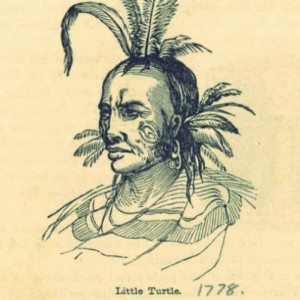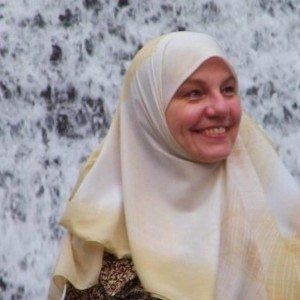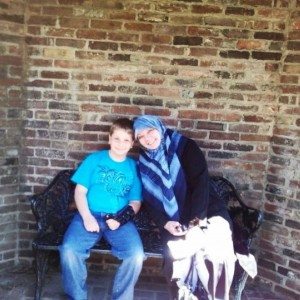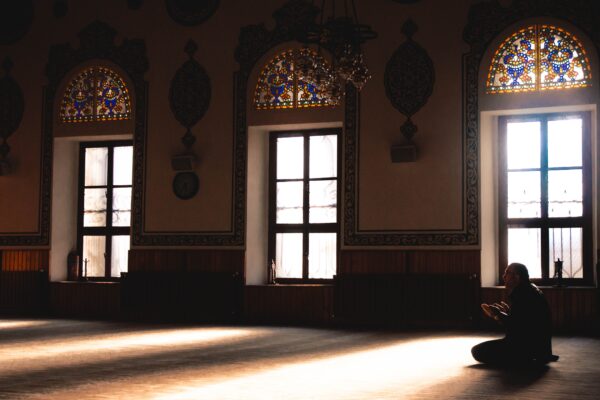I sat there and cried. I didn’t want it. I really didn’t. I sobbed and said to myself, “Oh no, this can’t be happening…I’m Muslim!”
INTERVIEW WITH DR. MARYAM BLACKEAGLE PART 1
Q: It’s not often that I come across a story that seals itself to my memory. Your story, Maryam, has haunted me since I heard it. Sometimes real life experiences are more riveting than fiction. May you tell us about your background first please? You’re the first Native American Muslim woman I’ve met.
A: Masha Allah, your words humble me. Yes, I am predominently Native American. My dad was Miami Wea and my mom is a mix of Cherokee and white. My grandfather was Chief Big Horse and his grandfather was Chief Little Turtle, who was one of the greatest war chiefs who lived up until the Battle of Little Big Horn.

I was born in a rural area, where my dad often hunted off the land. Occasionally he would take me with him and instruct me to crawl on the ground to smell out the trails left by the animals. My happiest memories are of me walking alone in the woods, listening to the wind in the trees and sitting on a log while eating wild berries.
Unfortunately by fifth grade, we moved to the concrete jungle that is Southern California. We lived in the foothills near a small reservation, which I would visit frequently just to be in the quietness. It almost was like medicine for my soul compared to the fast-paced life of the city.
I have learned that it is not what life throws at you that identifies you, but the way you handle it. It was a long process and a very hard one. The transition from a victim to a survivor is very difficult, but essential.
Sadly, the Native tribes have been greatly decimated throughout the years. Traditional Native life is one that is filled with dignity, and “walking the red road” means to walk in a sacred way. However, many of the tribes have lost their identity, and when you take away a people’s identity, rob them of their self-worth, you often destroy that presence of dignity. Some tribes are very strong and work hard on correcting the wrongs that have occurred, but many Natives struggle with issues such as domestic violence, alcoholism, and various forms substance abuse.
I came from a very dysfunctional family and at an early age, I ran away. In some ways, I went from the frying pan into the fire. I was a young girl caught in an adult world trying to survive as best as I could – which often meant a lifestyle that was quite self-destructive.
Q: Were you an independent child and teen? How did your upbringing affect your personality?
A: I grew up in a very abusive environment. While my parents did not drink, many of my kin did. That often turned violent. I remember frequently hiding in a closet when they came to visit. My dad, while not a drinker, was a very abusive man. My mom was a young girl with no formal education who just accepted the way things were.
I was 14 the first time I ran away, but I was caught and was sent back. The second time I ran, I was 15 and I was determined not to return this time. I went to court and became an emancipated minor.
You might understand then, why my happiest moments were alone in the woods. After I ran away, I was a child in an adult world…but there were no woods anymore. Often, I thought that God must truly hate me to give me the life I had. I absolutely hated myself.
Q: Before we go on, I want you to know that I’m praying for you (and I’m sure the readers are too) with every passing sentence.
When did you first start to contemplate God and our purpose in this life?
A: Thank you sister. It was a long time ago. I have learned that it is not what life throws at you that identifies you, but the way you handle it. It was a long process and a very hard one. The transition from a victim to a survivor is very difficult, but essential.
 I started going to a “hippy church” in my twenties. It was filled with love and acceptance and when I was there, I felt very happy. I would attend the Christian rock concerts in the park and every time they would do an alter call (where they ask those who wish to give their life to the Lord to come on stage), I would go up. [laughs] I don’t know how many times I did that, but I always felt the urge and would just do it.
I started going to a “hippy church” in my twenties. It was filled with love and acceptance and when I was there, I felt very happy. I would attend the Christian rock concerts in the park and every time they would do an alter call (where they ask those who wish to give their life to the Lord to come on stage), I would go up. [laughs] I don’t know how many times I did that, but I always felt the urge and would just do it.
The problem was, as much as I enjoyed these activities, they never stopped me from doing things destructive to myself. They were nothing more than temporary bandaids over wounds that just couldn’t heal.
Living in Southern California, everyone was from somewhere else – including me. I had friends from many different countries. I loved diversity and while my parents were quite prejudicial, I found beauty in the differences.
After I ran away, I was a child in an adult world…but there were no woods anymore. Often, I thought that God must truly hate me to give me the life I had. I absolutely hated myself.
Some of my friends were from different Muslim countries. We all got along pretty well; we went out together, partied together, etc. It was a lot of fun, but on occasion, religion came up and they would adopt a superior tone when speaking about how great Muslims were compared to Christians.
I thought how dare they think that they are better than me when they did the same things I did (and some of them did things far worse!). So I decided I would do some research about Islam and prove that it was garbage and teach them a lesson (this was in the 80’s, where not many sources for research was available).
Q: How old were you then?
A: I was a 24-year-old nursing student.
I was also someone with a serious issue with addiction. I lived in two worlds basically. I was a single mom with a severely ill child who was trying hard to make life better, but at the same time, I was lost in self hatred and substance abuse. My life was always one step forward and two steps back.
I was also amazed at the things I read in the Quran…the similarities with Native philosophy, the responsibility and relationship mankind has with all of creation…it was beautiful.
I had absolutely no desire to change my faith and felt it would be very easy to prove Islam false. After all, I had seen the news. I knew an Iranian during the time of the revolution in Iran who told me how awful, oppressive, and unjust Islam was. So I was sure it would be a quick and easy task.
Q: Was it as easy as you had presumed?
A: Well, I had gotten a sackful of books from a guy who seemed to be the quietest in the group; the one who had a little more respect than the others. I don’t think he thought I was even going to read them but I did. There was a book called ‘Inquiries Into Islam’. It was a discussion between a Muslim scholar and a Christian minister.
 I sat with that book, the Bible and the Quran, and checked each reference the book made. I would read something in the book and say to myself, “The Bible doesn’t say that!” Then I would look it up and sure enough, it was there.
I sat with that book, the Bible and the Quran, and checked each reference the book made. I would read something in the book and say to myself, “The Bible doesn’t say that!” Then I would look it up and sure enough, it was there.
Over and over, I checked the Bible for the verses that were parallel to the Quran, trying to find an error, but there weren’t any. I became quite frustrated as it wasn’t going as planned.
I was also amazed at the things I read in the Quran…the similarities with Native philosophy, the responsibility and relationship mankind has with all of creation…it was beautiful. What I was reading wasn’t about oppression and the degradation of women. It was about dignity, piety, and the oneness of God. What Jesus had said in the Bible was the same message I found in the Quran.
Q: What happened during your research? Did you start to believe that what you were reading was the Truth?
A: It was strange…the more I read, the more I needed to read.
I remember trying to put the Quran down at one point, and it was like a voice in my head told me to keep reading…keep reading. It became almost like an obsession – for every thing I learned, I wanted to know even more.
One day, while I was sitting under a tree reading the Quran, I suddenly felt like I got slapped across the face and kicked in the stomach at the same time. I literally doubled over. I could not breath. It was like the wind had been knocked out of me. But what had been knocked out of me so forcefully was not just air – it was pride. The veil had been lifted; I saw the truth. Not just the truth of Islam, but the truth of myself – who I was, how I lived, and where I was going if I did not change.
I sat there and cried. I didn’t want it. I really didn’t. I sobbed and said to myself, “Oh no, this can’t be happening…I’m Muslim!”
To be continued…
(Part 2 of this remarkable interview can be found here.)





